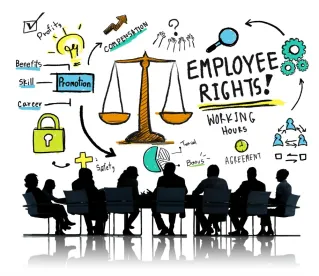The beginning of 2016 is a busy year for New York employers. Both the state and New York City have enacted a variety of laws expanding protections for employees. Employers need to review their policies to ensure they are in compliance.
NEW YORK STATE
Effective January 19, 2016, the New York State Human Rights Law [pdf] was amended in three respects:
-
Pregnancy Accommodation: First, the Law was amended to require employers to provide reasonable accommodations for pregnancy-related conditions, unless the accommodation would place an undue burden on the employer. Pregnancy‑related conditions include “a medical condition related to pregnancy or childbirth that inhibits the exercise of a normal bodily function or is demonstrable by medically accepted clinical or laboratory diagnostic techniques; provided, however, that in all provisions of this article dealing with employment, the term shall be limited to conditions which, upon the provision of reasonable accommodations, do not prevent the complainant from performing in a reasonable manner the activities involved in the job or occupation sought or held; and provided further, however, that pregnancy-related conditions shall be treated as temporary disabilities for the purposes of this article.” The employee must cooperate in providing medical or other information that is necessary to verify the existence of the pregnancy-related condition or that is necessary for the accommodation. Employers with employees in New York City should already have compliant policies in place, as New York City’s Human Rights Law already required employers to provide reasonable accommodations to address the needs of an employee for her pregnancy, childbirth or related medical condition. A number of other states and cities have similar pregnancy accommodation requirements.
-
Familial Status: Second, the Human Rights Law was amended to add familial status as a protected characteristic. Familial status is defined as “any person who is pregnant or has a child or is in the process of securing legal custody of any individual who has not attained the age of eighteen years” or “one or more individuals (who have not attained the age of eighteen years) being domiciled with: (1) a parent or another person having legal custody of such individual or individuals, or (2) the designee of such parent.”
-
Sexual Harassment Expanded to All Employers: Finally, the sexual harassment prohibitions of the Human Rights Law were expanded to include protection for employees of employers with fewer than four employees. Thus, all New York State employers, regardless of size, must comply with the sexual harassment provisions of the Human Rights Law.
Pay Equity / Protections for Employees Discussing Compensation: Also effective January 19, 2016, New York State’s Pay Equity bill amended Section 194 of the New York Labor Law, strengthening existing equal pay law. In particular, the bill amended the law to, inter alia, prohibit employers from banning employee discussions about pay (although employers may establish reasonable limitations on the time, place, and manner of such discussions via a written policy), expand the definition of “same establishment” from meaning the same workplace to any workplace for an employer in the same county, and add a requirement that employers defending against pay discrimination claims establish a “bona fide” factor other than sex (such as education, training or experience) for a challenged pay structure. In addition, employers guilty of willful violations of the law will now be liable for liquidated damages of up to 300% (up from 100%) of the wages found to be due.
NEW YORK CITY
Gender Identity: In addition, in December 2015, the New York City Commission on Human Rights issued enforcement guidance [pdf] regarding gender identity or expression discrimination. Under New York City law, employers are prohibited from discriminating against applicants or employees on the basis of gender identity, gender expression, transgender or intersex status. The guidance provides a number of gender‑related definitions and examples of prohibited discriminatory conduct. Given the immense civil penalties ($125,000+) that could be imposed for infractions, employers would be wise to review their policies and practices to ensure compliance.
Caregiver Status: Effective May 5, 2016, “caregiver status” will be added as a protected class to the New York City Human Rights Law, making it illegal to discriminate against an employee based on his or her status or perceived status as a caregiver. A caregiver is defined as “a person who provides direct and ongoing care for a minor child or care recipient”. A “care recipient” is also defined under the law and means “a person with a disability who: (i) is a covered relative, or a person who resides in the caregiver’s household; and (ii) relies on the caregiver for medical care or to meet the needs of daily living.” The full text of the bill, passed on December 16 and signed into law by the Mayor on January 5, 2016, is available here.
Commuter Benefits: Effective January 1, 2016, New York City Local Law 53 (also known as the Commuter Benefits Law [pdf]) requires employers to give full-time employees the opportunity to use up to $255 per month in pre-tax income to purchase qualified transportation fringe benefits. Luckily, employers have a six month grace period to comply with the new law; the Department of Consumer Affairs will not begin enforcing the law until July 1, 2016. Violations can result in fines of up to $250 per violation. For more information, go here.
Ban the Box: New York City recently joined the growing list of states, counties, and cities which have a “ban the box” law in effect. Effective October 27, 2015, the Fair Chance Act expanded the definition of “unlawful discriminatory practice” to include “any inquiry or statement related to the pending arrest or criminal conviction record of any person who is in the process of applying for employment . . . until after such employer or agent thereof has extended a conditional offer of employment to the applicant.” Thus, employers are prohibited from:
-
asking applicants if they have previously been arrested or convicted of a crime or otherwise referencing arrest or conviction history;
-
using phrases such as “background check required” “must have a clean record” or “no felonies” on the job application or when advertising for positions; and
-
asking an applicant to authorize a background check (or performing a background check).
A prospective employer may only ask about the applicant’s criminal history after making a conditional offer of employment. At that time, the law delineates what the prospective employer may review and consider as part of its inquiry into the applicant’s criminal history. If the prospective employer decides to withdraw the offer of employment as a result of the inquiry, it must (1) give the applicant a copy of any background check or other documents used to determine that s/he had a criminal record, (2) evaluate the applicant under the statute and provide a written notice of the inquiry and factors considered to the applicant (model form available here [pdf]), and (3) allow the applicant at least three business days to respond to the analysis (while holding the position open). A fact sheet for employers from the New York City Commission on Human Rights is available here.
Finally, while you are updating your New York policies, don’t forget make sure your company is in compliance with New York City’s credit check law (see our previous post here), which makes it an unlawful discriminatory practice for employers to request or use consumer credit history for employment purposes or otherwise discriminate against an applicant or employee based on their consumer credit history. Also, on January 14, 2016, New York City’s Department of Consumer Affairs issued updates to the City’s FAQs on its paid sick leave law.





 />i
/>i

